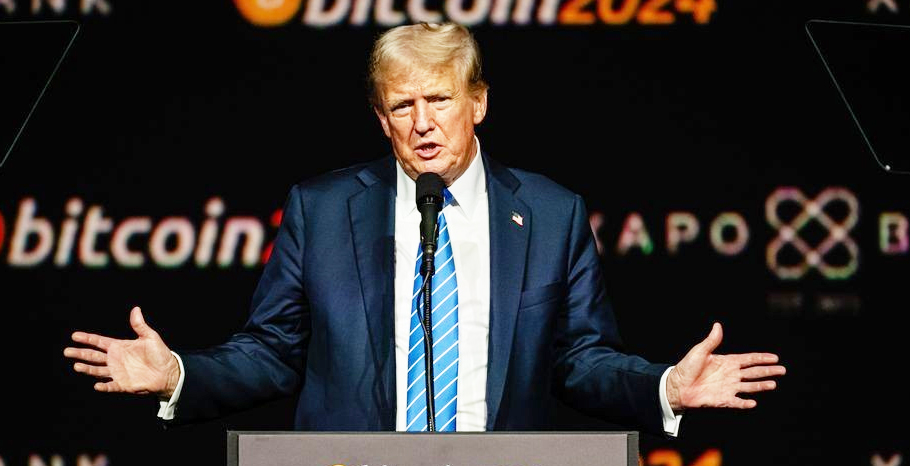WASHINGTON, Jan 20: The value of bitcoin soared past USD 109,000 early Monday, just hours before President-elect Donald Trump’s inauguration, as an enthusiastic cryptocurrency sector anticipates decisive actions upon his return to the White House.
Once a skeptic who previously labeled bitcoin as something that “seems like a scam,” Trump has now embraced digital currencies with fervor. He has initiated a new cryptocurrency venture and has pledged on the campaign trail to transform the US into the “crypto capital” of the globe early in his presidency.
His commitments include establishing a US crypto stockpile, implementing industry-friendly regulations, and even appointing a dedicated crypto “czar” within his administration.
“You’re going to be very happy with me,” Trump told cryptocurrency advocates at a bitcoin conference last summer.
Bitcoin, the world’s leading cryptocurrency, was launched in 2009 as a form of digital cash that operates independently of banks or governments. It, along with newer cryptocurrencies, has evolved from a fringe financial instrument to a key player in the mainstream economy, albeit with significant fluctuations.
The extreme volatility of cryptocurrencies, alongside their association with criminal activities, scams, and rogue nations, has drawn criticism from numerous quarters, asserting that these digital currencies have limited purpose and often resemble Ponzi schemes.
However, cryptocurrency has consistently rebutted detractors and weathered several significant price declines throughout its brief existence. Wealthy individuals within the crypto space, who felt unfairly targeted by the Biden administration, invested heavily to support Trump’s successful bid in the November election. Following Trump’s win, bitcoin prices surged, hitting over $100,000 last month before briefly retracting to approximately USD 90,000. On Friday, it increased by about 5%, and it experienced a leap of more than USD 9,000 early Monday, as reported by CoinDesk.
Just two years prior, bitcoin was trading at around USD 20,000.
Trump’s appointments for key cabinet and regulatory roles feature numerous supporters of cryptocurrency, including those heading the Treasury and Commerce departments, as well as the chairperson of the Securities and Exchange Commission.
Prominent industry figures organized the inaugural “Crypto Ball” on Friday to honor the first “crypto president.” The event achieved a sell-out status, with ticket prices reaching several thousand dollars.
Here’s a look at some key initiatives Trump might pursue in the early phase of his administration:
CRYPTO COUNCIL
As a candidate, Trump assured the creation of a specialized advisory council to provide recommendations aimed at formulating “clear” and “straightforward” regulations on cryptocurrency within his first 100 days in office.
While details about the council and its members remain vague, Trump appointed tech executive and venture capitalist David Sacks to serve as the administration’s crypto “czar” after his election victory in November. Additionally, he selected former North Carolina congressional candidate Bo Hines to be the executive director of the “Presidential Council of Advisers for Digital Assets” in late December.
At last year’s bitcoin conference, Trump assured crypto supporters that new regulations “will be created by people who love your industry, not hate your industry.” His nominee to head the SEC, Paul Atkins, is a notable advocate for cryptocurrencies.
Crypto investors and firms expressed frustrations over what they perceived as a hostile Biden administration, which they felt engaged in excessive enforcement actions and restrictive accounting practices that hampered innovation within the sector—especially as experienced at the hands of outgoing SEC Chairman Gary Gensler.
“As far as general expectations from the Trump Administration go, one of the most favorable outcomes would be a shift in tone at the SEC,” remarked Peter Van Valkenburgh, executive director of the advocacy organization Coin Center.
Gensler, who will step down as Trump assumes office, expressed pride in his office’s efforts to regulate the cryptocurrency industry, which he characterized as “rife with bad actors.”
STRATEGIC BITCOIN RESERVE
Trump additionally vowed that his presidency would see the US government accumulate a stockpile of bitcoin, similar to its existing gold reserves. During the bitcoin conference earlier this summer, he stated that the US government would retain, rather than auction off, the billions of dollars in bitcoin it has confiscated through law enforcement efforts.
Crypto proponents have circulated a draft executive order online that seeks to establish a “Strategic Bitcoin Reserve” as a “permanent national asset” managed by the Treasury Department through its Exchange Stabilization Fund. This draft stipulates that the Treasury Department will eventually possess at least $21 billion in bitcoin.
Republican Senator Cynthia Lummis of Wyoming has introduced legislation requiring the U.S. government to build a bitcoin reserve, which advocates argue would diversify government assets and mitigate financial risks. Detractors, however, contend that the volatile nature of bitcoin makes it an unsuitable reserve asset.
Establishing such a reserve would also mark a “significant advancement toward bitcoin gaining acceptance and legitimacy among those who currently do not view it as credible,” noted Zack Shapiro, an attorney and head of policy at the Bitcoin Policy Institute.
ROSS ULBRICHT
During the bitcoin conference earlier this year, Trump was met with enthusiastic applause as he reiterated his commitment to commuting the life sentence of Ross Ulbricht, the convicted founder of the Silk Road, a drug-selling website that utilized cryptocurrency for transactions.
Ulbricht’s case has galvanized some cryptocurrency advocates and Libertarian activists who argue that government investigators exceeded their authority in building their case against Silk Road. (AP)


Leave a Reply